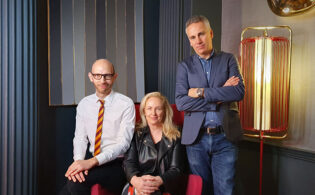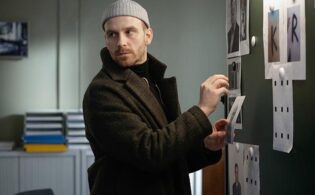 Over his career, Walter Iuzzolino has developed a keen eye for quality prime-time programming. He was a commissioning editor at Channel 4, where he developed numerous successful factual formats, and later the creative director at the factual-entertainment and formats outfit betty. Iuzzolino then decided to follow his dream of creating a streaming service dedicated to foreign-language drama. He spent hundreds of hours watching series from around the world before founding Walter Presents in 2014 with partners Jason Thorp and Jo McGrath. The OTT service launched first in the U.K., then the U.S., Australia, New Zealand, Italy, Belgium, Russia and Canada, with more countries to follow. Iuzzolino talks to TV Drama about his criteria for choosing series, the uptick in subscribers since the onset of the pandemic, and setting up a production arm, Eagle Eye Drama.
Over his career, Walter Iuzzolino has developed a keen eye for quality prime-time programming. He was a commissioning editor at Channel 4, where he developed numerous successful factual formats, and later the creative director at the factual-entertainment and formats outfit betty. Iuzzolino then decided to follow his dream of creating a streaming service dedicated to foreign-language drama. He spent hundreds of hours watching series from around the world before founding Walter Presents in 2014 with partners Jason Thorp and Jo McGrath. The OTT service launched first in the U.K., then the U.S., Australia, New Zealand, Italy, Belgium, Russia and Canada, with more countries to follow. Iuzzolino talks to TV Drama about his criteria for choosing series, the uptick in subscribers since the onset of the pandemic, and setting up a production arm, Eagle Eye Drama.
TV DRAMA: What are your criteria for choosing series?
IUZZOLINO: When I started Walter Presents almost seven years ago, I set myself three criteria, and they’ve never changed. I found them very useful as an initial tool to approach content that comes from abroad.
First, I wanted pieces that were big, successful, commercial hits in their country of origin. When we launched Walter Presents in the U.K., [watching programming with] subtitles was considered a snobbish, non-mainstream activity. I didn’t believe that, and I didn’t like that. Because I was raised in Italy, I was used to dubbed television, although I don’t like dubbing. But what was good about dubbing in Italy when I was growing up was that you had access to content from all over the world. Language was never a barrier to the appreciation of a piece of content because for us, everything was in Italian. We would watch American drama, Italian drama, French drama and have those open windows on the rest of the world. When I came to London, it was quite clear that everything was very Anglophile and Anglo-American. International content that was dubbed and subtitled was not cutting through. So, my ambition was to create a brand that would be mainstream, broad and commercially successful. I liked the idea of shows that are watched by millions of people in their country of origin. I found that very appealing because it went against the snobbery or perceived elitism of the idea. Success in the country of origin was always a very important piece.
Second, I looked at the overall quality of the piece. The writing, acting and directing needed to be of the highest caliber, the kind of standard that was set by HBO in the ’90s, from The Sopranos onward. The crafting that used to be happening in independent cinema in America and has moved to television.
And the third point was critical acclaim. I was interested in pieces that were winning awards on the international festival circuit. I remember saying to myself, If two out of three of these criteria are met, then I should seriously consider the piece. The quality of execution was always the top criteria. However, it is either wonderfully made and successful in its country of origin or wonderfully made and critically acclaimed.
The type of series I look for hasn’t changed. When we started, it was almost 100 percent crime thrillers, with the very odd exception. I would say 60 percent to 65 percent of what we buy is crime thrillers, but we’ve broadened because we’ve launched in so many countries. We have learned from every territory where we have launched, and we’ve enlarged the scope, scale and taste palette of the offering. We have family sagas. We are starting to open up to historical costume dramas. We have some pieces that are strongly younger-skewing. We had a vampire piece for the U.K. and acquired something that is YA. We don’t do comedy. We can do a bit of comedy-drama, but it’s very rare because I’ve found that these pieces struggle.
TV DRAMA: How do you curate the offering for each individual territory?
IUZZOLINO: My ambition from the start was that we would be ever more coordinated in our schedule. In the beginning, we had to do a bit of bespoke because we launched in the U.K. in 2016 and the U.S. in 2017, so a lot of titles had either gone here or gone there. I needed to acquire complementary pieces to add volume. But now that we are in eight countries, it’s become much easier. I tend to buy for all our territories. There are subtle nuances in how our viewers watch programming, but broadly speaking, I found that viewers of glossy, well-crafted, box-set television love the same stories all over the world. A great story is a great story. And our slight focus on crime drama means that a lover of crime is a certain type of viewer, and they are everywhere.
TV DRAMA: Since the pandemic, have you noticed any changes in viewing habits?
IUZZOLINO: Yes and no. The viewing patterns have changed significantly. The pandemic has been almost a cultural earthquake for our industry. I was talking to a couple of friends who work in linear television and they were saying this will probably be remembered as a very interesting moment of transition, where streaming has become incredibly mainstream. All the channels that have well-crafted streaming offerings have done well because, during the lockdown, people had a lot more time at home and they’ve been digging deeper into the archives. The advantage of streaming at this difficult time in our lives has been that we’ve all been able to access great stories. We have never done better at Walter Presents. Our streaming figures in the U.K., the U.S. and across the world are skyrocketing.
What is interesting about that, again, is because people have more time to view, they have been going beyond the poster lineup, so to speak. Often, when you don’t have much time, you dip in and out of what is heavily promoted and marketed. But I have noticed that people dip into the archive, and when they discover the offering, they have gone much more vertical. So there is consumption of a lot of titles, even older ones that we launched a while ago, that people maybe hadn’t had the time or the patience or the circumstances to go through yet.
In terms of genres, not much has changed. If you are a lover of historical costume drama, you will have dug deeper into that vein. I’ve also seen that a lot of disaster movies have done really well. I don’t think the pandemic changed the genres we are watching. The change was more in our viewing habits and when and how we want content. The streaming world fully benefited from the pandemic.
TV DRAMA: What motivated setting up Eagle Eye Drama?
IUZZOLINO: From the moment we started Walter Presents, it became clear that there were wonderful stories around the world and great IP. Our job was always to enhance and increase the popularity and success of original content with subtitles around the world. But there is also a capacity issue, in the sense that it fundamentally remains a slightly niche proposition because subtitles are still subtitles. This is changing every year. But we always thought it would be exciting for us, as the curator of this content, to also be able to identify content that is ripe for reinvention and reimagine it for an Anglo-American audience. That has worked incredibly well. We started last November; we optioned a number of titles, and we have several projects we are working on. We’re in production on a few things. We are very close to filming the crime drama Professor T, a show for ITV. It’s been cast with Ben Miller and Frances de la Tour as the main protagonists. It’s a procedural in the sense that it’s self-concluding, but it has a great arc and story about an obsessive-compulsive criminologist. We have two more projects [including Before We Die for Channel 4, adapted from the Swedish crime thriller].
It’s an exciting time because I think great ideas travel. They travel in their original form and also as original IP that can be reconfigured. But the one difference to our approach is that we source the talent truly internationally. As curator of Walter Presents, I get to know great writers, directors and costume directors from all over the world. I have this privilege of buying shows from Belgium, Brazil, Central Europe, Eastern Europe, Italy and so on. We’ve created a contact book of great talent behind the screen; talent that normally doesn’t have access to the world of making drama in English. We bring them together and configure these teams with superb talent, which makes me hope that the tone of our productions will be interesting and different. We’re not cloning anything. We are putting together phenomenal teams to reimagine pieces of IP and make them distinctive.
 TVDRAMA
TVDRAMA






